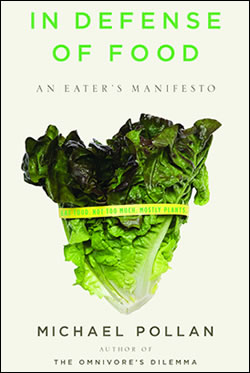 As diet fads continue to rule Western culture, food industry takes full advantage of the consumer's weakness for anything labeled either "heart-healthy" or "nutritionally whole," or especially, "enriched with daily essential vitamins or minerals." Michael Pollan argues his opinion of Western diet in his book, In Defense of Food: An Eater's Manifesto. Within the first chapters, Pollen explains how food is no longer seen to the diet-crazed consumer as just a source of daily nourishment, but rather as an item consisting of individual nutrients.
As diet fads continue to rule Western culture, food industry takes full advantage of the consumer's weakness for anything labeled either "heart-healthy" or "nutritionally whole," or especially, "enriched with daily essential vitamins or minerals." Michael Pollan argues his opinion of Western diet in his book, In Defense of Food: An Eater's Manifesto. Within the first chapters, Pollen explains how food is no longer seen to the diet-crazed consumer as just a source of daily nourishment, but rather as an item consisting of individual nutrients.I agree with Pollan, in that consumers, myself included, tend to focus directly on the nutrition facts label upon picking up an item at the grocery store. Shopping for groceries has transformed from finding everything on a list to still finding everything on a list BUT only while checking to make sure every item is "nutritionally sound." Yet, it seems like everything on the market these days is packed full of extra vitamins and minerals which leads me to another point of Pollan's of which I agree: scientists can find an antioxidant or additional nutrient in just about any plant-based food they choose to study, leading consumers to think they are purchasing best food available.
Many foods have gotten the "good nutrient" marketing treatment. Pollan's example of a pomegranate, "now [known to] protect against cancer and erectile dysfunction," shows the new marketing ploy to reel in more customers. Initially, I believe studies that show the advantages of eating certain foods do rely on proven facts, but during the marketing process of such foods, embellishment of facts can prove to be misleading. These interviews with everyday consumers clearly shows their preference to certain products strictly because those products have been given a "good nutrient" type of image, and backs up Pollan's assertion that consumers are prone to buy products that have been labeled as "healthy."
Michael Pollan doesn't beat around the bush when he states his argument that the food industry has exploited the consumer's attention to the nutritional aspects of food and he creates an awareness of the negative effects of wearing the "nutrition label blinders."
Works Cited:
Pollan, M. (2008). In defense of food: An eater's manifesto. New York, NY: Penguin Books.
Photo Credit:
Google Images